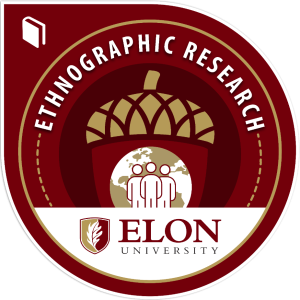 “Ethnographic Research” Digital Badge
“Ethnographic Research” Digital Badge
The Ethnographic Research micro-credential and digital badge program accesses current resources, courses and programs in order to provide students with clear pathways to mastering the skills necessary to conduct rigorous, ethical ethnographic fieldwork that culminates in a high-quality project. The program provides students with a valuable skill set relevant for graduate schools and employers, encourages deeper and more widely accessible engagement in undergraduate research, fosters integrative learning, and supports Elon’s commitment to engaged and experiential learning.
The primary goal of this micro-credential is to provide students with an opportunity to develop and apply the skills necessary to conduct substantial and ethical ethnographic fieldwork and to formalize that skill set with a digital badge with which graduate schools and employers can recognize the student’s achievement. For more information about the badge program, see Elon’s Digital Badging Page or go directly to the Credly’s Elon page.
To get started, please contact Dr. Devin Proctor at dproctor2@elon.edu for access to the Ethnographic Research Moodle course.
Goals & Outcomes
Exhibit a clear understanding of ethnography and ethnographic methods
Students will develop an understanding of ethnography both as a process and a product. This understanding should include key assumptions, functions, and goals of the ethnographic enterprise. These include but are not restricted to the following:
- Explain and implement ethnographic research techniques
- Develop an understanding of multiple ethnographic approaches
- Develop an understanding of the scope and appropriate uses of different types of interview and observation methods.
Apply a thorough understanding of ethnography in a substantive field experience
Students will engage in significant ethnographic fieldwork whether in one or multiple field sites. All of the following aspects of ethnographic fieldwork must be conducted in an ethnical manner. (Please see PERCS Ethics Modules for models and examples.)
- Design research project grounded in contemporary theory
- Establish rapport with a group of people for the purposes of research
- Conduct interviews
- Engage in participant observation and immersion
- Produce ethnographic field notes that include the process of reflection
- Analyze field data
- Situate findings within current scholarship
Demonstrate an understanding and use of ethical inquiry
Ethnographers must have a thorough understanding and application of ethical modes of research, beginning with research design, continuing through fieldwork, and including decisions about the presentation and dissemination of the research (please see PERCS Ethics Module). Further, students should acquire a strong understanding of diversity and cultural variation when going into the field. The goal of ethnography is not to judge a culture but to better understand a culture; therefore, ethnographers must be trained to recognize their ethnocentric assumptions and biases when conducting research.
Produce an ethnographic project of high quality
Students will ultimately produce and disseminate their findings in an ethnographic project. This project might include, but is not restricted to, any of the following:
- Journal length article
- Digital or multi-media presentation/project
- Descriptive ethnographic writing
- Ethnographic materials for use within or by the community
Submit a written description and reflection of how you have met these goals
Students will describe and explain how they met each of the requirements of the digital badge. Specifically students should address:
- How their understanding of ethnography and the ethnographic process changed over the course of their work.
- The process of their ethnographic field project: the who, what, where, when, why and how of their projects.
- How they ensured their work was ethical, from the initial development of the project to the final product, dissemination and withdrawal from the community. They must note how they applied the PERCS Ethics module to the work.
- Students will also reflect on this process, considering the impact their work had on the community, on individuals within that community, on scholarship in the area in which they worked, and on their own personal growth.
Requirements
To earn a PERCS Certificate, students are required to complete all of the following, and upload proof via the Ethnographic Research Moodle course:
- PERCS Ethics Module (on Moodle)
- CITI Certification
- IRB Approval
- Production of an ethnographic project of high quality through ONE of the following:
- 4 s.h. of an upper-level course that involves ethnographic research (in e.g., ANT, SOC, REL, IGS, WGS)
- 4 s.h. of 4999 or 4998 undergraduate research
- 2 s.h. of 4999 or 4998 + internship or study abroad
- SURE: Summer Undergraduate Research Experience
PERCS Ethics in Fieldwork Module
Based on making ethical decisions to promote equity & inclusion and to protect study participants before, during, and after field study, this guide addresses ethical concerns throughout the process of fieldwork.
CITI Certification
To earn your Collaborative Institutional Training Initiative (CITI) certification, please go to Elon’s CITI Training portal. There you will find a link on the left for the CITI Course in the Protection of Human Research Subjects. Follow the instructions to complete your training. You should complete the “Social and Behavioral Responsible Conduct of Research, Basic Course.” Print out your certification to submit with your final materials.
IRB Approval
Most likely, your research will require Institutional Review Board (IRB) approval. Students cannot serve as the Principal Investigator on an IRB application, so please work with your mentor to submit this application. For more information, please visit Elon’s IRB homepage.
Before diving in, are you interested in learning about…
Also, be sure to check out some completed ethnographic projects from past years.